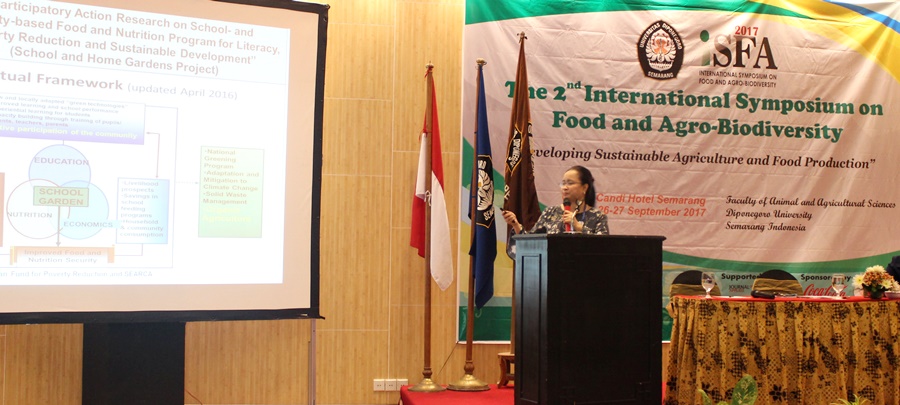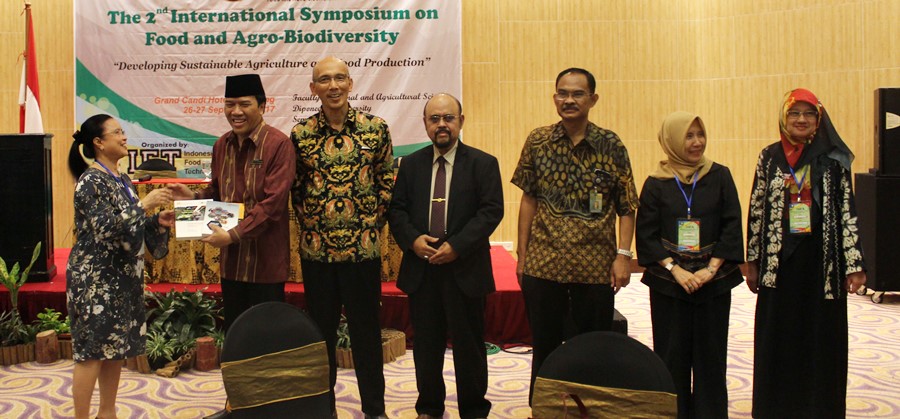SEARCA's Program Head for R&D, Dr. Bessie M. Burgos, served as one of the four keynote speakers of the symposium. In her presentation titled Building ISARD with Agrobiodiversity: Towards Food Security and Community Livelihoods, Dr. Burgos explained the rationale behind SEARCA's focus on inclusive and sustainable agricultural and rural development (ISARD) in its current Five-year Plan. She discussed the overall development trends in Southeast Asia and why agriculture remains to be important, as well as the issues and challenges that frame the context and defining elements of ISARD. Dr. Burgos described the attributes inherent to agriculture that make agricultural and rural development (ARD) a major driver of poverty reduction and inclusive growth, namely, that agriculture is labor-intensive and that it has strong backward and forward linkages in the domestic economy. Dr. Burgos also discussed ARD within the context of advancing the goal of sustainability. She then shared with the participants important lessons, drawn from SEARCA's five decades of experience in ARD, for competitive, inclusive and sustainable agricultural systems, which include the following: (1) importance of community participation; (2) understanding community context and needs; (3) strategic networking and linkages for financial, technical, institutional and market support; (4) ecosystems/landscape approach to planning; (5) development of entrepreneurship and participation in agricultural value chains; (6) inter- and transdisciplinary approach to R&D; and (7) mainstreaming biodiversity in agriculture. Dr. Burgos concluded her presentation by reiterating the importance of focusing R&D and capacity building activities on ISARD, using as guideposts the Sustainable Development Goals 2030, ASEAN Vision for the Socio-cultural Community, Vision for ASEAN Cooperation in Food, Agriculture and Forestry, Convention on Biological Diversity, and Aichi Biodiversity Targets, among others.
The other keynote speakers of the symposium were Prof. Nengchang Chen of Guangdong Institute of Eco-environmental Science and Technology, China (Soils Problems in China and Lessons for Other Developing Countries); Prof Shigeru Hayakawa of Kagawa University, Japan (Development of Tasty and Healthy Olive Products in Kagawa, Japan); and Mr. Agung Primanto Murdanoto from the private sector P.T. R.N.I., Indonesia (Greatest Challenge in Agriculture Sustainability in Indonesia).
The ISFA 2017 was opened by Diponegoro University Rector Prof. Yos Johan Utama, the symposium Chairperson Prof. Anang Legowo, and the Dean of the Faculty of Animal and Agricultural Sciences and SEARCA alumnus, Prof Moh. Arifin. It was attended by more than 120 participants from within and outside Indonesia and featured 104 papers on the following topics: food process and engineering; food safety and security; agriculture for healthy future; agriculture economics; agricultural production systems; and agriculture biotechnology. (Bessie M. Burgos)


